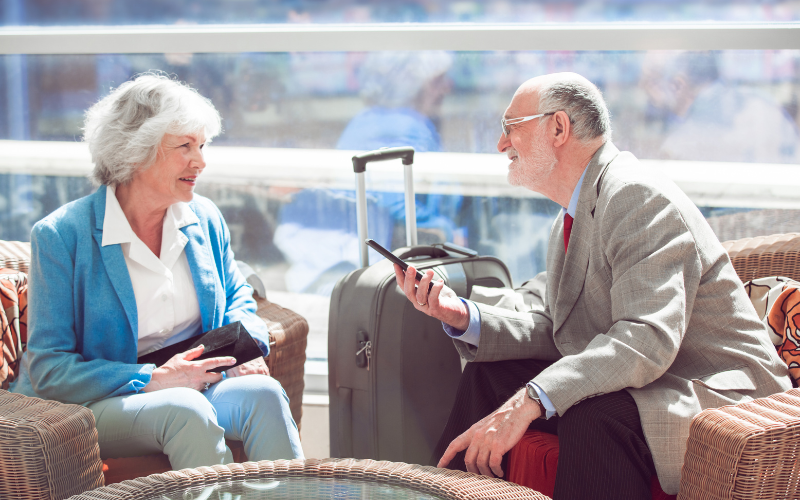
Caring for an elderly relative is possible even when living at a distance. Long-distance caregiving involves supporting someone while residing an hour or more away. Despite the challenges that physical distance presents, caregivers can effectively manage many important tasks through effective planning and communication.
Regardless of income, employment status, gender, or age, anyone can engage in long-distance caregiving. Responsibilities might include providing emotional support through regular phone calls or video chats, managing finances by overseeing bills and budgeting, arranging in-home care by coordinating with local services, creating emergency plans that detail responses to various scenarios, and keeping family members informed about the relative’s health and well-being through updates and regular communication with other family members.
Additionally, caregivers can leverage technology and local resources to bridge the gap, ensuring that their loved one receives consistent care and attention. By maintaining a network of support, long-distance caregivers can ease the burden and share responsibilities, ensuring that their elderly relatives feel supported and cared for, even from afar.
Step 1: Make an In-Person Visit
Long-distance caregivers start their role by visiting the care recipient’s home. An in-person visit not only relieves the primary caregiver for a brief time, but also allows the long-distance caregiver to see what is needed. A home evaluation may be conducted to ensure the environment is safe for the senior.
While at the care recipient’s home, discuss with the primary caregiver all the ways long-distance caregiving can make a positive impact. Research local resources for help. Develop a solid understanding of the senior’s health and needs to make informed decisions.
You should also use this time to visit with your loved ones and enjoy their company. Seniors who live a long distance from their relatives may feel lonely and isolated. Spending some quality time catching up with them and doing fun activities such as going shopping or out to dinner will help them feel more connected.
Step 2: Establish Access to Financial and Medical Information
The in-person visit is crucial to starting off the long-distance caregiving process. The senior will be able to help locate necessary paperwork and fill them out. Request access to the senior’s financial and medical information so that details may be shared with the long-distance caregiver. Hold a discussion with the senior about designating a durable power of attorney to make healthcare and financial decisions. Remember, if the senior becomes physically or cognitively unable to make decisions and she does not have a durable power of attorney, the courts will step in.
Step 3: Organize a Team
Handling certain responsibilities, like bill paying, can be done remotely. However, long-distance care is most successfully accomplished with a team of caregiving helpers. Create a list of contacts who are available to help the senior, whether it is to mow the lawn or deliver groceries.
Stay in touch with the senior’s medical team. Hold regular conference calls with the elderly individual’s doctors, geriatric care manager, social worker, and nurses. Understand your loved one’s medical condition to better assist with healthcare management and help prevent a crisis. A long-distance caregiver who has not already hired a geriatric care manager or eldercare coordinator should consider it. As licensed social workers or nurses, geriatric care managers help with the logistics of caregiving. These professionals serve as mediators when decision-making between family members is difficult.
Step 4: Stay Connected
Technology makes staying in the loop easier than ever. Regular communication with the senior and the caregiving team is crucial to the success of long-distance caregiving. Group emails can be sent to the team to keep all members updated on the senior’s well-being. Besides group emails, video chats, and other social tools, long-distance caregivers may set up video monitors in the senior’s home. The senior might also agree to wear a tracking device, especially if she wanders. A caregiver should get permission from the senior or legal proxy to implement technology.
Additional technology advancements that bring peace of mind to long-distance caregivers are electronic pill dispensers that notify caregivers when medicine is taken as well as bed alarms that alert caregivers when the senior steps out of bed and climbs back in.
Give the senior a cell phone and help the individual learn how to use it. Program important numbers for doctors, family members, friends, and the long-distance caregiver into the phone. Consider including speed-dial numbers. Be prepared, however, to be inundated with phone calls from the senior.
Step 5: Use Online Delivery Services
There may be several reasons why your elderly loved ones cannot run important errands, including inclement weather or being unable to drive. If your loved ones cannot make it to the store or pharmacy to get the things they need, you can take advantage of online delivery services.
Long distance caregivers can set up online delivery services for groceries, medications, take-out, and anything else they may need. Delivery apps such as InstaCart, Amazon, MedNow, and Uber Eats can easily be controlled by a long-distance caregiver whenever those in their care need something delivered to their home.
Step 6: Use Mobility Services
For seniors who cannot drive but still like to get out of the house to run errands or go out to dinner, mobility services can provide transportation to get them to their destination safely. Long distance caregivers can make arrangements with local mobility services that cater to seniors to take care of errands like grocery shopping and prescription pickups and ensure they get to doctor appointments. These services can also be used to visit friends and family and go on outings such as dinner or a movie.
Step 7: Use Local Resources
Local resources that help with long-distance caregiving may be found online. Websites, like Eldercare Locator, the National Institute on Aging and the Family Care Navigator, provide ample information about caregiving. Local senior centers might also offer assistance with long-distance caregiving. Learn how to be a long-distance caregiver from courses offered by local chapters of the American Red Cross. Some nonprofits might also provide training to long-distance caregivers. For help paying for courses, long-distance caregivers may look into Medicare and Medicaid.
Long-distance caregiving is also made easier with the support of trustworthy caregiving professionals. Contact home care agencies in the area in which the senior resides. Professional caregivers work in the senior’s home and may be hired briefly, such as in respite care, or for extended durations. Home care agencies retain teams of trained professional caregivers who are experienced in handling all aspects of senior care. Usually, the caregiving tasks are non-medical. But families may hire licensed nurses to provide skilled medical care if the senior requires medical attention.
When researching home care agencies, long-distance caregivers should look for licensed, bonded, and insured companies. Agencies require their caregivers to be background checked prior to hire. Also ensure the professional caregiver can administer first aid and CPR in case of an emergency.
Assisting Hands Helps Long Distance Caregivers
Assisting Hands Home Care is a trusted care provider for families with long distance caregivers seeking reliable home care services. As a reputable elder care provider, we offer qualified caregivers who assist your loved ones with daily activities at home. You can expect quality, compassionate care when you work with Assisting Hands.
Our professional caregivers can help with in-home activities, including bathing, toileting, grooming, meal preparation, and grocery shopping. If your loved one is hesitant to drive, we ensure safe transportation to doctor appointments or the senior center.
Our elder care services are flexible to meet diverse needs. Some families engage our services for respite care, offering primary caregivers much-needed relief, while others rely on us for post-surgical care, 24-hour home care, live-in care, or overnight care. We tailor care plans to specifically address your loved one’s unique requirements.
Assisting Hands Home Care can become a dependable part of your caregiving team and help relieve some of the stress that comes with providing long-distance care. Our home care agency is dedicated to serving the needs of seniors living in Deerfield, Buffalo Grove, Grayslake, Green Oaks, Hawthorn Woods, Highland Park, Lake Forest, Lake Zurich, Libertyville, Lincolnshire, Mundelein, Round Lake Beach, Vernon Hills, Illinois, and its surrounding communities. Call us at (224) 268-9068 to schedule your free in-home consultation.
















